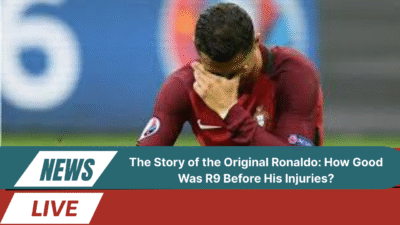What if Alan Shearer Had Signed for Manchester United in 1996? This question has echoed through football discussions for decades, sparking heated debates among fans, pundits, and historians alike. At the heart of this intriguing scenario lies the biggest transfer what-if in Premier League history.
In the summer of 1996, Shearer was at the peak of his powers. Fresh off a golden boot performance at Euro 96, he was the most sought-after striker in the world. Manchester United, under Sir Alex Ferguson, had their eyes firmly set on him. Yet, instead of donning the famous red of Old Trafford, Shearer chose his hometown club Newcastle United.
But what if things had gone differently? How would United’s dominance in the late ’90s have changed with Shearer leading the line? Would Newcastle’s history be written in bolder letters, or would their decline have happened sooner? This article dives into the alternate timeline where Shearer swapped black-and-white stripes for United’s red shirt, analyzing its potential impact on football history, culture, and legacy.

The Summer of 1996: A Turning Point in Premier League History
Alan Shearer’s Rise to Stardom Before 1996
By 1996, Alan Shearer was already a proven goal machine. Having starred for Blackburn Rovers and won the Premier League title in 1995, he established himself as England’s number one striker. His consistent performances made him the most expensive player in the world, drawing attention from top European clubs.
Why Sir Alex Ferguson Wanted Shearer
Sir Alex Ferguson had built a dynasty at Manchester United but was always hungry for improvement. With Eric Cantona nearing the end of his career, Ferguson sought a striker who could guarantee goals. Shearer fit that bill perfectly, combining strength, finishing, and leadership.
Newcastle United’s Winning Bid
Despite Ferguson’s pursuit, Newcastle United swooped in with a record-breaking £15 million bid. Shearer’s emotional connection to his boyhood club sealed the deal, creating one of the most dramatic transfer stories of the decade.
Manchester United’s Actual 1996–97 Season
Key Players and Team Dynamics Without Shearer
Manchester United retained their dominance in England even without Shearer. The team relied on players like Solskjær, Cole, Cantona, and Giggs. Their fluid attack ensured they remained competitive across all competitions.
The Role of Eric Cantona and the Class of ’92
Cantona’s influence was still vital in guiding the likes of Beckham, Scholes, Giggs, and Neville. Without Shearer, Cantona remained the focal point of United’s attack during the 1996–97 season, before his unexpected retirement in 1997.
Alternate Timeline: If Shearer Joined United
How the Attack Might Have Looked with Shearer
Imagine a front line of Shearer, Cantona, and Giggs with Beckham delivering pinpoint crosses. United’s attack could have been nearly unstoppable, combining creativity, flair, and ruthless finishing.
Possible Impact on Eric Cantona’s Career
Would Cantona have retired earlier if Shearer took center stage? Some believe his presence could have shortened Cantona’s United career, altering the club’s history dramatically.
Tactical Adjustments Under Sir Alex Ferguson
Ferguson may have shifted tactics to accommodate Shearer’s physical style, possibly altering how United’s midfield developed. Scholes might have played deeper, while Beckham’s role on the wing would have grown even more pivotal.
Potential Ripple Effects Across Premier League History
Could United Have Dominated Even More?
With Shearer’s goals, United might have added to their trophy count earlier, possibly winning more Champions League and league titles in the late 1990s.
How Newcastle United’s Fate Would Have Changed
Without Shearer, Newcastle may have struggled earlier. Their “Entertainers” era under Kevin Keegan could have fizzled out faster, leaving the club without their talisman to carry them.
The Knock-On Effect for Other Clubs
Arsenal’s rise under Wenger, Liverpool’s rebuild, and Chelsea’s transformation under new ownership could all have been indirectly influenced by Shearer’s decision.
Shearer’s Legacy: Newcastle Hero vs Manchester Legend
Comparing Career Stats with and without the Hypothetical Transfer
Had Shearer played at Old Trafford, his already incredible 260 Premier League goals might have been even higher, given the creative supply of United’s midfield.
Fans’ Perspectives on the Biggest Transfer What-Ifs
For Newcastle fans, Shearer remains a legend who chose loyalty over glory. For United fans, the thought of pairing him with Ferguson’s dynasty remains the ultimate dream scenario.
Media and Cultural Impact of the Transfer That Never Happened
How Newspapers Covered the Saga in 1996
The media frenzy surrounding Shearer’s choice dominated headlines. Papers framed it as a victory for passion over pragmatism, portraying Shearer as the loyal hometown hero.
Football Culture and Transfer Dramas
The Shearer saga set the stage for future transfer dramas, highlighting how emotion, identity, and loyalty can sometimes outweigh money and trophies.
Modern Parallels: Similar Transfer What-Ifs in Football
Cristiano Ronaldo and Manchester United
Just like Shearer, Ronaldo’s multiple stints at United demonstrate how one player can reshape a club’s destiny. His 2003 arrival and 2021 return were both defining moments.
Other Iconic Transfers That Changed Clubs Forever
Moments like Thierry Henry joining Arsenal or Steven Gerrard staying at Liverpool show how one player’s decision can ripple across generations.

FAQs: Answering the Most Common Questions
Q1: Why didn’t Alan Shearer sign for Manchester United?
Shearer chose Newcastle United due to emotional ties with his hometown and the chance to play under Kevin Keegan.
Q2: Would Manchester United have won more trophies with Shearer?
It’s likely. His goals could have given United an even stronger edge in the Premier League and Europe.
Q3: Did Sir Alex Ferguson regret missing out on Shearer?
Ferguson admitted disappointment but went on to build successful teams with other strikers like Dwight Yorke, Andy Cole, and Ole Gunnar Solskjær.
Q4: Where does Shearer rank in Premier League history?
Shearer is still the Premier League’s all-time top scorer with 260 goals, a record unlikely to be broken soon.
Q5: What makes this one of the biggest transfer what-ifs?
Because it involved the best striker of his generation and the most dominant club of the era, creating a truly tantalizing alternate reality.
Conclusion
The story of what if Alan Shearer had signed for Manchester United in 1996 remains one of the most fascinating tales in football history. While United continued to dominate and Shearer became Newcastle’s greatest icon, the thought of them uniting still sparks wonder. It’s a reminder that football is not just about goals and trophies—it’s about choices, loyalty, and the legacies that could have been.










